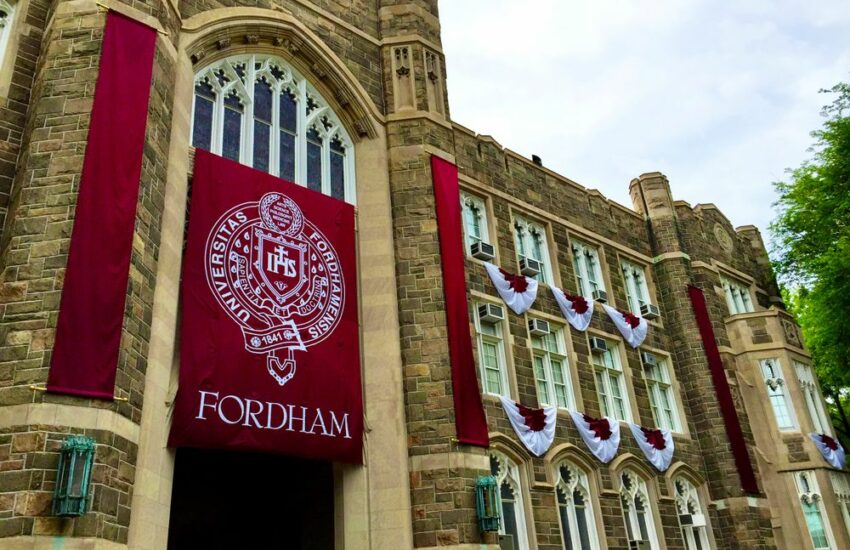International Day of Women and Girls in Science
By Laura Childs (Emerging Technologies Librarian) and Mariah Lewis (Metadata Management Librarian)

Every year, February 11th is recognized as the International Day of Women and Girls in Science. The United Nations General Assembly instituted this day to promote gender equality in the STEM professions and raise awareness of the lack of women in the sciences. Research from the UNESCO Institute for Statistics finds that less than 30% of science researchers worldwide are women. According to the UNESCO report, “Cracking the Code: Girls’ and Women’s Education in Science, Technology, Engineering and Mathematics (STEM),” published in 2017, only about 30% of all female students pursue STEM-related degrees in higher education.
Because February is also Black History Month, we want to celebrate this International Day of Women and Girls in Science by acknowledging just a few black women in the sciences. Keep reading to learn about five extraordinary women who changed the world with their contributions, from traveling into space to inventing new methods of eye surgery. Explore the books, articles, and videos we’ve curated. Make an effort to listen to their voices as you go forward in your own research. We hope their stories inspire you to learn more about women in the sciences.
Marie Clark Taylor (1911-1990)
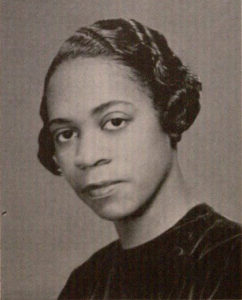
Marie Clark Taylor is one of Fordham’s own history makers. She was the first woman to graduate with a science doctorate degree from Fordham University in 1941, a Ph.D in Biology. In 1945, she began teaching in the Howard University Department of Botany, and served as the Department Chair from 1947-1976.
Throughout the 1950s-60s, Taylor taught summer institutes as part of the National Science Foundation, where she trained high school biology teachers. She advocated for the use of botanicals in high school biology classes because plants were affordable materials and effective for demonstrating biological processes. In the mid-1960s, President Lyndon B. Johnson even enlisted Dr. Taylor to consult in the U.S. and abroad, thus expanding the NSF program to teachers around the world.
Read more about Marie Clark Taylor:
- Black Women Scientists in the United States by Wini Warren
- Available at Walsh Library Reference/QuinnX: Q141 .W27 1999
- “Fordham’s First Female Ph.D” (The Fordham Ram, 2017)
- “50 Years of Doctoral Education: 1958-2008” (Howard University, 2008)
Mae Jemison (1956-)
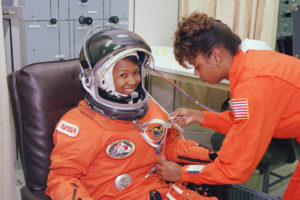
Mae Jemison’s background in the sciences goes far beyond her voyage into space. Jemison earned two degrees during her undergraduate education at Stanford University- one in Chemical Engineering and one in African and African American Studies. She attended Cornell Medical School during which times she led a study in Cuba and worked at a refugee camp in Thailand. She joined the PeaceCorps before opening her own medical practice.
She later applied to the astronaut program in 1985 and, due to the Challenger explosion, reapplied in 1987 before she was chosen for the program. She worked for NASA and eventually went to space on the Endeavor in 1992, becoming the first African American woman in space. After her time as an astronaut she founded both The Jemison Group and the Dorothy Jemison Foundation for Excellence. She is currently leading the 100 Year Starship Project.
Read more about Mae Jemison:
- Profiled in Brazen: Rebel Ladies Who Rocked the World by Pénélope Bagie
- Available at Walsh/Quinn: CT3207 .B3413 2018
- Profiled in In Search of Our Roots by Henry Louis Gates, Jr.
- Available at Walsh: E185.96 .G384 2009
- Profiled in Black Heroes by Jessie Carney Smith
- Available in Walsh Reference: E185.96 .B53 2001
Shirley Ann Jackson (1946-)
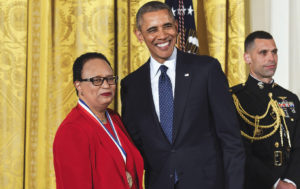
Shirley Ann Jackson is currently the 18th President of Rensselaer Polytechnic Institute, the oldest technological research university in the U.S. Her list of achievements is quite amazing, to put it mildly. Dr. Jackson was the first African-American woman to receive a doctorate degree from MIT, where she earned her Ph.D. in Theoretical Elementary Particle Physics. In 2014, she received the National Medal of Science from President Barack Obama in recognition of her contributions to the physical sciences.
Dr. Jackson has accomplished many “firsts” in her life. She was the first African-American woman to serve as the Chairman of the United States Nuclear Regulatory Commission (NRC), to which she was appointed in 1995 by President Clinton. In 1999, she became the President of RPI, and was both the first woman and first African-American to hold that position. Time Magazine has called Dr. Jackson “perhaps the ultimate role model for women in science.” We can see why!
Read more about Shirley Ann Jackson:
- Profiled in Sisters in Science by Diann Jordan
- Available at Walsh: Q141 .S526 2006
- Profiled in Black Heroes by Jessie Carney Smith
- Available at Walsh Reference: E185.96 .B53 2001
- Shirley Ann Jackson Biography (RPI, Office of the President)
- “The Remarkable Career of Shirley Ann Jackson” (MIT Technology Review, 2017)
- National Women’s Hall of Fame: Shirley Ann Jackson
Patricia Bath (1942-2019)
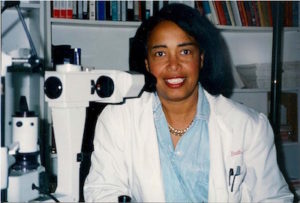
New York City native Patricia Bath was an ophthalmologist and laser scientist best known for her invention of the Laserphaco Probe, a new device and method for performing cataract surgery. For that invention, she was the first African-American woman to receive a medical patent in 1988. Now, that device is used by doctors around the world.
In 1973, Dr. Bath was the first African-American person to complete a residency in ophthalmology at New York University, and she would then go on to be the first woman faculty member in the Department of Ophthalmology at UCLA’s Jules Stein Eye Institute. In 1993, she was named a Howard University Pioneer in Academic Medicine.
Read more about Dr. Patricia Bath:
- Profiled in Headstrong: 52 Women Who Changed Science by Rachel Swaby
- Available at Walsh/Quinn: Q130 .S93 2015
- Changing the Face of Medicine: Dr. Patricia E. Bath (National Institutes of Health, 2015)
- Dr. Patricia Bath Biography (TheHistoryMakers)
- Patricia Bath: Laserphaco Probe (Lemelson-MIT)
Marie Maynard Daly (1921-2003)
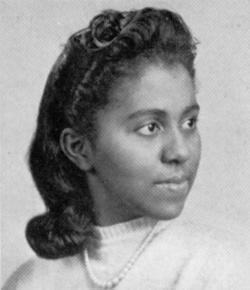
Dr. Marie Maynard Daly is a New York City native, born in Queens. She was also the first African American woman to earn her Ph.D. in chemistry in the United States. She obtained her undergraduate Chemistry degree at Queens College in Flushing before attending- and completing- her master’s degree in Chemistry at New York University in one year. She graduated from Columbia University in 1947 with her Ph.D. in the same field and worked with the American Cancer Society on a grant project following her graduation that led to a research project at the Rockefeller Institute of Medicine.
She completed ground-breaking research on the human body that led to the understanding that food and diet can affect the heart and circulatory system. Dr. Daly also taught biochemistry classes and led efforts to enroll students of color in graduate level science programs and medical schools, eventually founding a scholarship in her father’s name at Queens College.
Read more about Marie Maynard Daly:
- African American Women Chemists by Jeannette E. Brown
- Available at Walsh Library: QD21 .B69 2012
- Available as an e-book from Fordham Libraries
- Royal Society of Chemistry: Dr. Marie Maynard Daly (2013)
- Science History Institute: Marie Maynard Daly (2018)
Who are some other amazing women in science we should know about? Let us know in the comments below!


